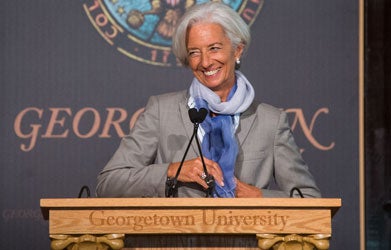Title: IMF’s Lagarde: World Financial Growth Still Falling Short
Christine Lagarde, managing director for the International Monetary Fund, told a Georgetown audience today that the current level of global economic growth will be insufficient to address the world’s most complex challenges.
OCTOBER 2, 2014– DESPITE SOME RECOVERY FROMthe worldwide 2008 financial crisis, the level of growth sustained will prove inadequate to address problems in today’s complex global society, said the managing director of the International Monetary Fund (IMF) at Georgetown today.
“There is some economic recovery but as you all know and as you can feel it … that growth is not enough to respond to the challenges that the world is facing,” said Christine Lagarde during her lecture in historic Gaston Hall. “We believe that the clouds can be pushed, provided that all policymakers actually aim higher, try harder, do it together and are country specific.”
NEW MOMENTUM
Lagarde’s talk, sponsored by the Office of the President, came just before the IMF and World Bank’s annual meetings Oct. 10-12 in Washington, D.C.
The French global leader became the first woman to head IMF in 2011 and the first woman to serve as minister of finance and economy for a G-7 economy prior to her appointment at IMF.
Lagarde said global policymakers face a crossroads with the world economy. If they fail to act on creating bold policies to create a “new momentum,” then a “new mediocre” era of stagnant economic growth will follow, she said.
“That momentum is quite special because it requires a better balance in our policy toolkit … and we have to use all the tools that are available,” said Lagarde. “Each policy instrument must play its part in order to achieve this momentum.”
DEEPER UNDERSTANDING

“There is some economic recovery but as you all know and as you can feel it … that growth is not enough to respond to the challenges that the world is facing,” says Christine Lagarde, managing director of the International Monetary Fund.
Lagarde joined the French government in June 2005 as minister for foreign trade after a brief stint as minister for agriculture and fisheries. She has also served as chair of the ECONFIN Council, which brings together economics and finance minsters of the European Union.
As a member of the G-20, Lagarde was involved in the group’s management of the 2008 financial crisis and helped foster international policies related to financial supervision and regulation to strengthen global economic governance.
She went on to serve as chair of the G-20 when France took over its presidency in 2011, and launched an agenda to reform the international monetary system.
“In today’s lecture, we seek to gain a deeper understanding of the financial challenges and opportunities of this moment and to engage in conversation on the policies and approaches that contribute to global prosperity and economic opportunity for all people,” said Georgetown President John J. DeGioia during his introductory remarks.
SUSTAINABLE VISION
Following Lagarde’s remarks, School of Foreign Service Acting Dean James Reardon-Anderson moderated a question-and-answer session with Georgetown students.
Lagarde thanked Georgetown for hosting her and noted that the university and the IMF shared a common mission to contribute to global peace and prosperity while developing future generations of leaders.
“The founders of your school [in 1789] had a very ambitious and sustainable vision,” she said. “But I’m sure that they had no idea only 70 years ago … the IMF would be founded with pretty much the same purpose and the same mission although using of course different means.”